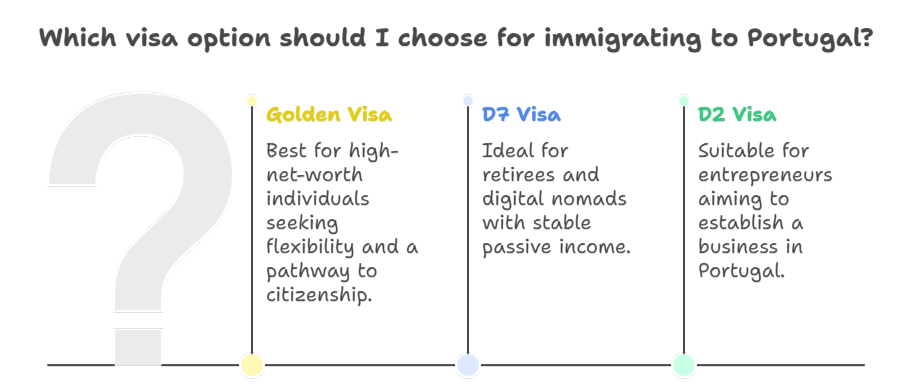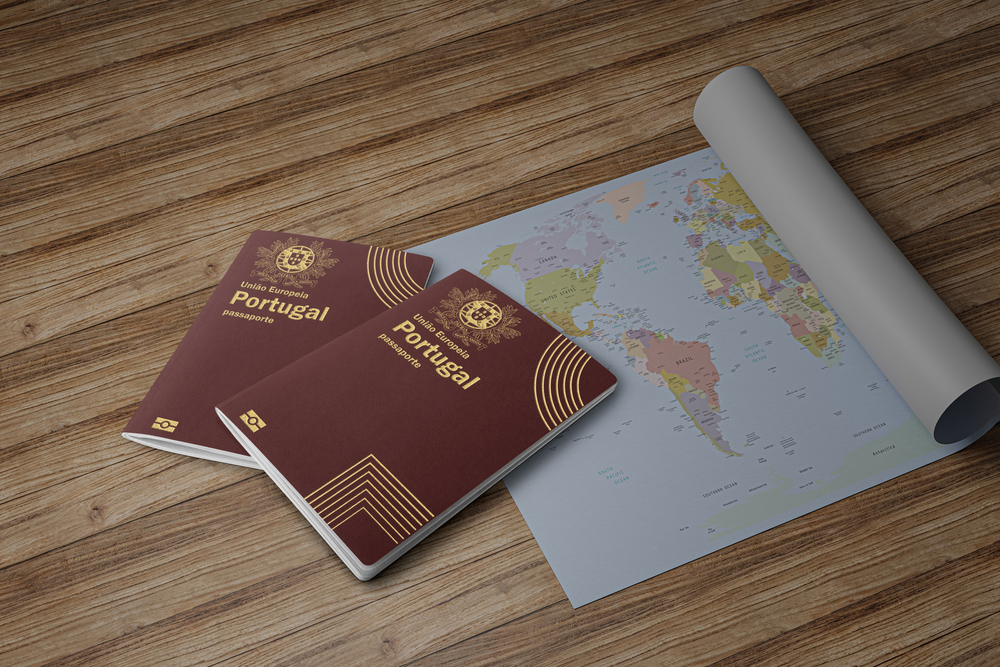Portugal is one of Europe’s most attractive countries for relocation. With its strategic location, strong economy, and high quality of life, it has become a hub for investors, retirees, and entrepreneurs. In 2025, three main routes stand out: the Portugal Golden Visa (ARI), the D7 Passive Income Visa, and the D2 Entrepreneur Visa. Each has unique eligibility criteria, timelines, and advantages.

Option 1: Portugal Golden Visa (ARI)
• Requires qualifying investments (regulated funds, cultural projects, donations).
• Minimal stay: 7 days in year 1, 14 days across the next 2 years.
• Includes spouse, children, and parents as dependents.
• Pathway to citizenship in 5 years.
• Best for: High-net-worth individuals seeking flexibility.
Option 2: D7 Visa (Passive Income)
• Requires proof of regular passive income (pensions, rental income, dividends).
• Minimum monthly requirement ~€870 in 2025 (multiplied for dependents).
• Must reside in Portugal for most of the year.
• Provides access to healthcare and education.
• Best for: Retirees and digital nomads with stable income.
Option 3: D2 Visa (Entrepreneur)
• Requires a business plan and evidence of sufficient funds.
• Designed for freelancers, entrepreneurs, and SMEs.
• Applicant must show intent to contribute to Portugal’s economy.
• Residency granted for running a viable local business.
• Best for: Entrepreneurs wanting to create an active presence in Portugal.
Comparison Table
| Factor | Golden Visa (ARI) | D7 Visa | D2 Visa |
| Requirement | Investment in funds/projects | Proof of passive income | Business activity + funds |
| Stay Requirement | Minimal (7–14 days) | High (must reside) | Moderate (active presence) |
| Processing Time | 6–12 months | 4–8 months | 4–8 months |
| Ideal For | HNIs, investors | Retirees, digital nomads | Entrepreneurs, freelancers |
Case Scenarios
• Maria, a retiree with pension income, applied under D7 and enjoys life in Lisbon.
• Hassan, a UAE entrepreneur, used the D2 route to open a café chain in Porto.
• Priya, an investor, chose the Golden Visa through a regulated fund, meeting the minimum stay requirements while maintaining her business abroad.
Financial Proofs Required
Golden Visa: Investment certificates, fund documentation, and government receipts.
D7 Visa: Bank statements showing passive income at or above €870/month.
D2 Visa: Business plan, proof of investment funds, and incorporation documents.
Processing Timelines
• Golden Visa: 6–12 months depending on investment route.
• D7 Visa: 4–8 months, including consular processing.
• D2 Visa: 4–8 months, depending on business verification.
Conclusion
Portugal offers three powerful residency options: the Golden Visa for investors, the D7 for passive income earners, and the D2 for entrepreneurs. Each aligns with different goals, lifestyles, and financial capabilities. By choosing the right program, applicants gain access to the EU, enjoy high-quality living, and secure a future pathway to citizenship.
FAQs
Q1: Can I include my family?
A: Yes, all three visas allow dependents.
Q2: Does the Golden Visa still include real estate?
A: No, real estate options were phased out; focus is now on funds and cultural investments.
Q3: Is the Portuguese language required for citizenship?
A: Yes, A2 level Portuguese is required for naturalisation.
Q4: Can I switch from D7 to Golden Visa?
A: Yes, if investment criteria are met later.
Q5: Do I need to pay taxes in Portugal?
A: Residents are subject to tax; the non-habitual resident (NHR) regime offers benefits.
Q6: How long until citizenship?
A: 5 years of legal residence.
Q7: Can retirees work under D7?
A: Yes, but the visa is designed primarily for passive income.
Q8: Can entrepreneurs hire staff under D2?
A: Yes, it strengthens your application.

